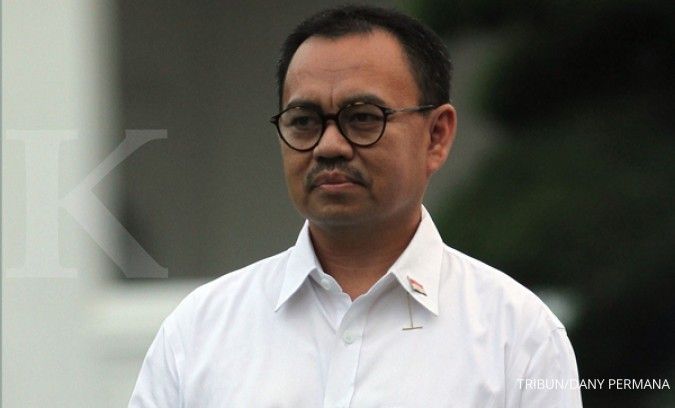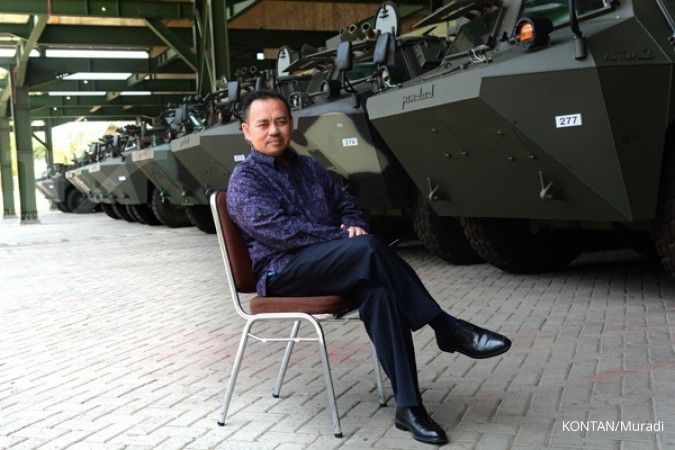JAKARTA. Newly appointed Energy and Mineral Resources Minister Sudirman Said has emphasized that appointing a permanent leader to the Upstream Oil and Gas Regulatory Special Task Force (SKKMigas) and settling the status of the corruption-tainted body will be a priority in his short-term program on the job. Speaking to reporters following a meeting with the agency’s leaders and employees on Friday, Sudirman said that he would soon propose a name to President Joko “Jokowi” Widodo to be appointed permanent leader of the agency. “The supervisory committee of SKKMigas will propose names and I, as the energy and mineral resources minister, will submit the proposal to the President,” Sudirman said. The supervisory committee consists of the energy and mineral resources minister, the deputy of energy and mineral resources, the deputy finance minister and the head of the Investment Coordinating Board (BKPM). The energy and mineral resources minister no longer has a deputy. SKKMigas is currently led by an acting chief who was appointed after its chief, Rudi Rubiandini, was detained last year by the Corruption Eradication Commission (KPK) over his involvement in graft. Rudi was sentenced to seven years in prison earlier this year in the graft case, which allegedly also involves former energy and mineral resources minister Jero Wacik. SKKMigas was formed in 2012 to take over the authority of upstream oil and gas regulator BP Migas, which was dissolved following a judicial review filed by a number of non-governmental institutions. The Constitutional Court declared the existence of BP Migas unconstitutional because it did not directly manage oil and gas resources as stated in the 1945 Constitution. It instead handed over management responsibilities to state-owned companies or private companies through a production sharing contract (PSC). Sudirman, who previously held key positions in state oil and gas firm Pertamina and Indika Energy, said SKKMigas would operate as usual until a new law on oil and gas was implemented. He said a government team was currently preparing a draft law that would replace the Oil and Gas Law. The new law is also expected to regulate the status of the oil and gas regulator. “We will follow the Constitutional Court ruling. We will see whether the regulatory body will be a state-owned company or part of the government. The important thing is that its functions will not be changed,” Sudirman said. Sudirman said he hoped the draft law would be completed soon and obtain approval from the House of Representatives so that SKKMigas or any new regulatory body could be given permanent status. SKKMigas acting chief Johanes Widjonarko said that changes in the temporary task force were inevitable. “Governance must be improved and there must be a law to regulate it. The law is being drafted and we will support it, even if we [SKKMigas] have to be dissolved,” Widjonarko has said. The deputy director of energy think tank ReforMiner Institute, Komaidi Notonegoro, said that the form of the new regulatory body depended on the government’s different options. “If it maintains PSC, the ideal form is a business entity, a state-owned firm, because a contract mechanism should be performed business-to-business. Whether the firm is under Pertamina or under the government, it will be the best option in the current situation,” Komaidi said. Currently, in the oil and gas sector, Indonesia implements a PSC system, in which oil and gas firms are contractors working on fields belonging to the country. The scheme gives control to the government as all expenditures of the companies must be approved by the owner of the resources and companies will be reimbursed when oil and gas activities are fruitful, which is commonly known as a cost recovery. (Raras Cahyafitri)
Govt to reinforce oil regulatory agency
JAKARTA. Newly appointed Energy and Mineral Resources Minister Sudirman Said has emphasized that appointing a permanent leader to the Upstream Oil and Gas Regulatory Special Task Force (SKKMigas) and settling the status of the corruption-tainted body will be a priority in his short-term program on the job. Speaking to reporters following a meeting with the agency’s leaders and employees on Friday, Sudirman said that he would soon propose a name to President Joko “Jokowi” Widodo to be appointed permanent leader of the agency. “The supervisory committee of SKKMigas will propose names and I, as the energy and mineral resources minister, will submit the proposal to the President,” Sudirman said. The supervisory committee consists of the energy and mineral resources minister, the deputy of energy and mineral resources, the deputy finance minister and the head of the Investment Coordinating Board (BKPM). The energy and mineral resources minister no longer has a deputy. SKKMigas is currently led by an acting chief who was appointed after its chief, Rudi Rubiandini, was detained last year by the Corruption Eradication Commission (KPK) over his involvement in graft. Rudi was sentenced to seven years in prison earlier this year in the graft case, which allegedly also involves former energy and mineral resources minister Jero Wacik. SKKMigas was formed in 2012 to take over the authority of upstream oil and gas regulator BP Migas, which was dissolved following a judicial review filed by a number of non-governmental institutions. The Constitutional Court declared the existence of BP Migas unconstitutional because it did not directly manage oil and gas resources as stated in the 1945 Constitution. It instead handed over management responsibilities to state-owned companies or private companies through a production sharing contract (PSC). Sudirman, who previously held key positions in state oil and gas firm Pertamina and Indika Energy, said SKKMigas would operate as usual until a new law on oil and gas was implemented. He said a government team was currently preparing a draft law that would replace the Oil and Gas Law. The new law is also expected to regulate the status of the oil and gas regulator. “We will follow the Constitutional Court ruling. We will see whether the regulatory body will be a state-owned company or part of the government. The important thing is that its functions will not be changed,” Sudirman said. Sudirman said he hoped the draft law would be completed soon and obtain approval from the House of Representatives so that SKKMigas or any new regulatory body could be given permanent status. SKKMigas acting chief Johanes Widjonarko said that changes in the temporary task force were inevitable. “Governance must be improved and there must be a law to regulate it. The law is being drafted and we will support it, even if we [SKKMigas] have to be dissolved,” Widjonarko has said. The deputy director of energy think tank ReforMiner Institute, Komaidi Notonegoro, said that the form of the new regulatory body depended on the government’s different options. “If it maintains PSC, the ideal form is a business entity, a state-owned firm, because a contract mechanism should be performed business-to-business. Whether the firm is under Pertamina or under the government, it will be the best option in the current situation,” Komaidi said. Currently, in the oil and gas sector, Indonesia implements a PSC system, in which oil and gas firms are contractors working on fields belonging to the country. The scheme gives control to the government as all expenditures of the companies must be approved by the owner of the resources and companies will be reimbursed when oil and gas activities are fruitful, which is commonly known as a cost recovery. (Raras Cahyafitri)



